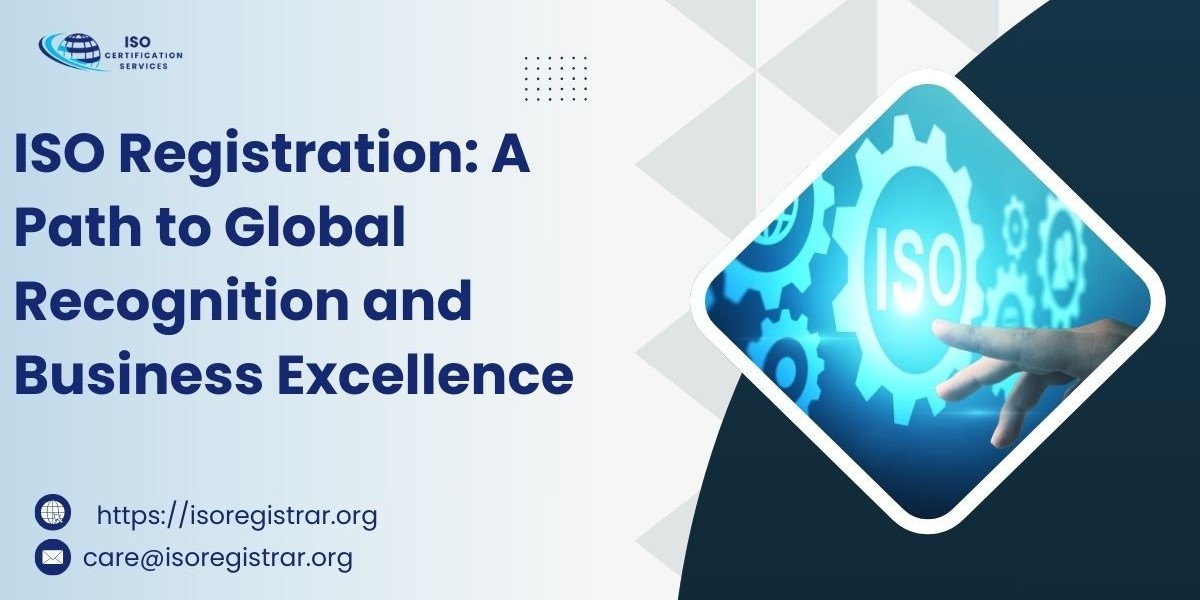In today’s competitive business world, companies are constantly striving to differentiate themselves from their competitors. Whether it’s improving product quality, enhancing customer satisfaction, or ensuring operational efficiency, businesses are seeking ways to build credibility and trust with their stakeholders. One way to achieve this is through ISO Registration, a globally recognized standard that assures customers of the quality, safety, and reliability of a company’s products and services.
ISO (International Organization for Standardization) is an independent, non-governmental international organization that develops and publishes standards to ensure quality, safety, and efficiency in various sectors. The ISO registration process allows companies to demonstrate compliance with these internationally recognized standards, helping them stand out in the marketplace. In this article, we will explore ISO registration, its significance, benefits, and the steps involved in achieving it.
What is ISO Registration?
ISO registration refers to the process of obtaining certification from an accredited body that confirms a company’s adherence to a particular ISO standard. These standards are developed to ensure that businesses operate in a way that maintains high-quality products or services, efficient processes, and adherence to specific environmental, health, or safety regulations.
ISO standards cover a wide range of industries and aspects of business operations, including quality management, environmental impact, health and safety, information security, and many more. Some of the most common ISO certifications include:
ISO 9001: Quality Management Systems (QMS)
ISO 14001: Environmental Management Systems (EMS)
ISO 45001: Occupational Health and Safety Management Systems (OHSMS)
ISO 27001: Information Security Management Systems (ISMS)
ISO 22000: Food Safety Management Systems (FSMS)
ISO registration is typically carried out by an independent certification body, which audits the company’s processes and systems to ensure they meet the specific requirements of the chosen standard. Once the company passes the audit, they receive an ISO certificate, which serves as proof of their commitment to quality, safety, and continuous improvement.
Why is ISO Registration Important for Businesses?
ISO registration is more than just a piece of paper. It serves as a reflection of a company’s dedication to meeting international standards and improving its operations. Here are some of the key reasons why ISO registration is important for businesses:
1. Increased Credibility and Trust
ISO certification enhances a company’s credibility in the eyes of customers, suppliers, and partners. It shows that the company meets high standards of quality, safety, and efficiency, which can improve its reputation in the marketplace. Customers often prefer businesses that are ISO certified because it assures them that the company follows industry best practices and is committed to delivering consistent results.
For businesses operating in competitive industries, ISO registration provides a distinct advantage by distinguishing them from companies that do not have certification. It serves as a mark of reliability and quality, making it easier to attract new customers and retain existing ones.
2. Improved Operational Efficiency
Achieving ISO certification requires businesses to implement standardized processes and systems. This means that operations are reviewed and optimized, leading to improved efficiency and cost-effectiveness. ISO-certified businesses are often able to reduce waste, streamline production processes, and minimize errors, leading to higher profitability.
ISO standards, such as ISO 9001 for quality management, focus on continuous improvement. This means that businesses are encouraged to regularly evaluate their processes, identify areas for improvement, and implement corrective actions. As a result, companies that are ISO certified tend to have more efficient operations and better overall performance.
3. Better Risk Management
ISO registration helps businesses identify and manage risks more effectively. By following internationally recognized risk management processes, companies can prevent problems before they occur and respond quickly to challenges when they arise. For example, ISO 45001 for occupational health and safety management helps companies reduce workplace accidents and ensure the safety of their employees.
ISO certification also helps businesses comply with relevant laws and regulations, reducing the risk of legal issues or penalties. This proactive approach to risk management can help businesses avoid costly mistakes and improve their ability to navigate complex challenges in the marketplace.
4. Access to New Markets and Opportunities
Many companies and government organizations require their suppliers to be ISO certified. This is especially true for businesses operating in sectors such as healthcare, manufacturing, and construction, where quality and safety are critical. By achieving ISO certification, businesses can open doors to new markets and increase their chances of winning contracts with large clients who prioritize certified suppliers.
ISO certification can also be beneficial for businesses looking to expand internationally. Many countries require ISO-compliant businesses to do business within their borders, and having an ISO certificate can make it easier for companies to access global markets.
5. Improved Customer Satisfaction
ISO certification is a clear indication that a company is dedicated to meeting customer needs and delivering consistent, high-quality products or services. As part of the ISO standard, businesses are required to gather customer feedback, track performance metrics, and make improvements based on customer input.
By implementing customer-centric processes and focusing on quality control, businesses with ISO certification are better positioned to meet or exceed customer expectations. This, in turn, leads to increased customer satisfaction, loyalty, and positive reviews.
Steps to Achieve ISO Registration
Choose the Right ISO Standard: Select the ISO standard that fits your business needs and aligns with your goals.
Visit the Certification Portal: Go to the official ISO certification website.
Fill Out the Application Form: Complete the online form, ensuring all details are accurate.
Submit Your Application: Review, submit, and double-check all details.
Payment: After submitting the form, pay the nominal charges.
Certificate Confirmation: A consultant confirms the ISO standard you're applying for.
Receive Your ISO Certificate: Once it’s approved, your ISO certificate will be sent to your registered email.
NOTE:- Apply for ISO CERTIFICATION 9001 : 2015
Conclusion
ISO registration is a powerful tool that can help businesses improve their operations, build credibility, and gain a competitive edge in the marketplace. By demonstrating compliance with internationally recognized standards, businesses can attract more customers, reduce risks, and improve their efficiency. ISO certification is not just a symbol of quality; it’s a commitment to continuous improvement and excellence.










